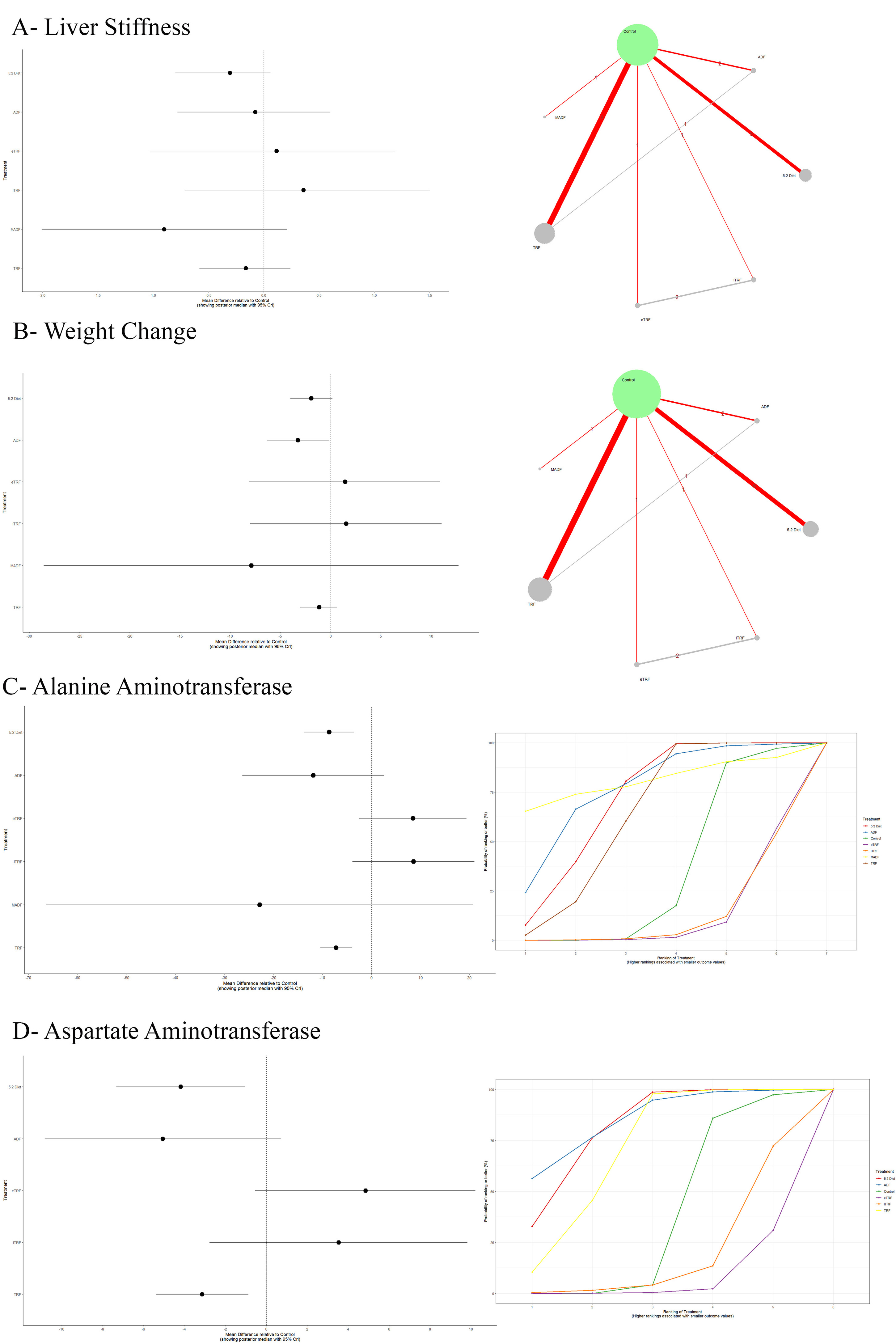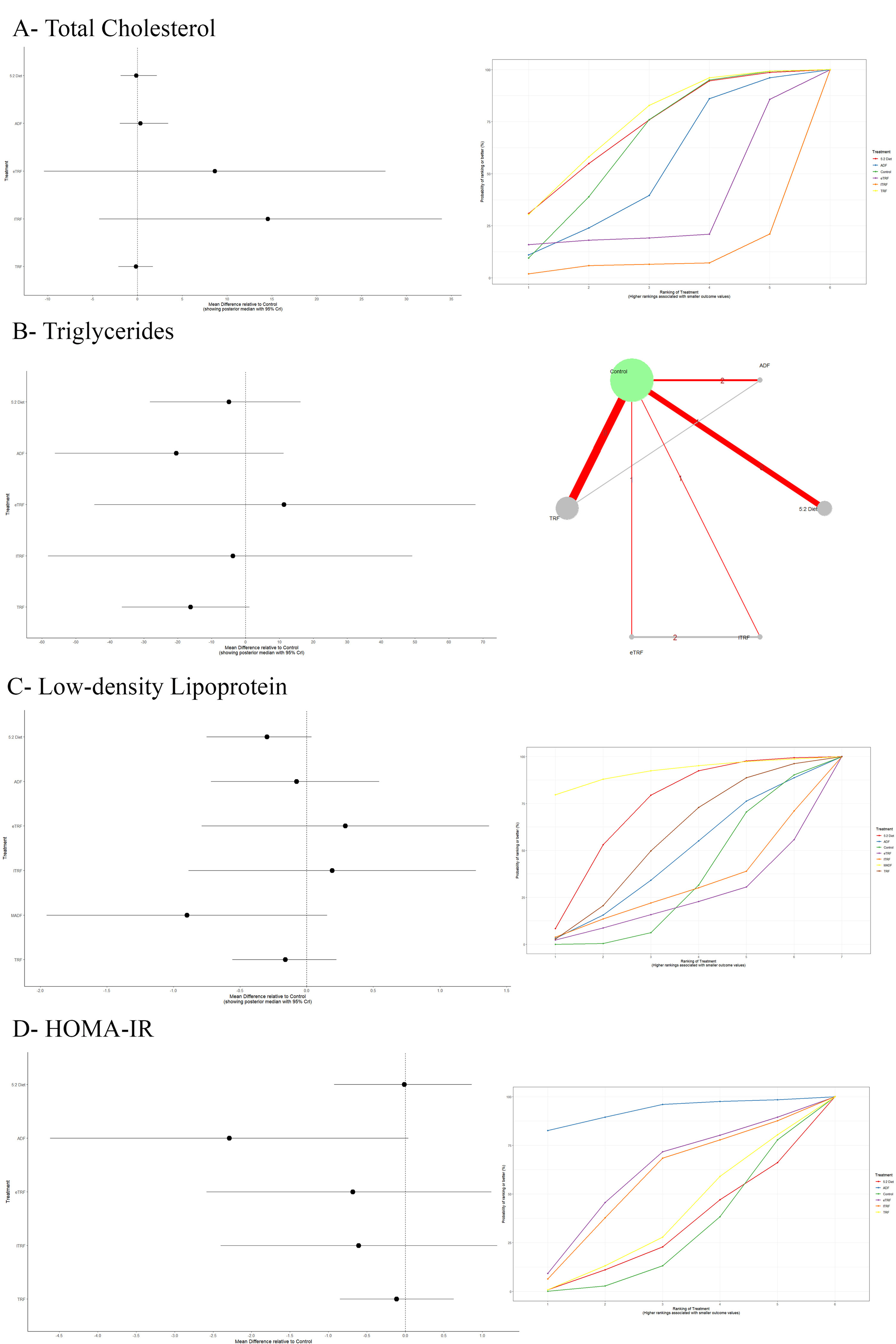Sunday Poster Session
Category: Liver
P1669 - Intermittent Fasting Strategies for Metabolic Dysfunction-Associated Steatotic Liver Disease: A Systematic Review and Bayesian Network Meta-Analysis
Sunday, October 26, 2025
3:30 PM - 7:00 PM PDT
Location: Exhibit Hall

Ismail Elkhattib, MBBCh
University of Nebraska
Hartford, CT
Presenting Author(s)
Husam Abu Suilik, MD1, M. Rafiqul Islam, 2, Moayad Alhawi, MD3, Abdellrahman Ashour, MD3, Hassan Abdalshafy, MBBCh4, Omar Abdullah Bataineh, MD5, Ahmed Farid Gadelmawla, MD6, Ismail Elkhattib, MBBCh7, Mohamed Abuelazm, 8
1The Hashemite University, Zarqa, Az Zarqa', Jordan; 2Shaheed Suhrawardy Medical College and Hospital, Dhaka, Bangladesh, Dhaka, Dhaka, Bangladesh; 3The Hashemite University, Az Zarqa, Az Zarqa', Jordan; 4Cairo University School of Medicine, Cairo, Al Qahirah, Egypt; 5Jordan University of Science and Technology, Irbid, Irbid, Jordan; 6Menoufia University, Menoufia, Al Minufiyah, Egypt; 7University of Nebraska, Hartford, CT; 8Faculty of Medicine, Tanta University, Tanta, Egypt, Tanta, Al Gharbiyah, Egypt
Introduction: Metabolic dysfunction-associated steatotic liver disease (MASLD) is a prevalent metabolic disorder characterized by excessive hepatic fat accumulation. Intermittent fasting (IF) has emerged as a potential therapeutic strategy, with the ability to induce weight loss, improve insulin sensitivity, and reduce hepatic steatosis. This study aims to compare the efficacy of various IF regimens for managing MASLD.
Methods: A systematic review and network meta-analysis of randomized controlled trials (RCTs) investigating different IF regimens for MASLD. PubMed, EMBASE, Web of Science, Scopus, and CENTRAL were searched until April 2025. A Bayesian network meta-analysis was performed in R (version 4.4.3) using pooled mean difference (MD) with 95% credible interval (CrI) relative to the control, based on random or common effects models as determined by the deviance information criterion (DIC), with quantification of the surface under the cumulative ranking (SUCRA).
Results: Our analysis included 19 trials comprising 1,149 participants. For liver stiffness, none of the IF regimens had a significant impact, with modified alternate-day fasting (MADF) showing the largest, non-significant reduction (MD: -0.90, 95% Crl: -2.01 to 0.21, SUCRA: 90.84), followed by the 5:2 diet (MD: -0.31, 95% Crl: -0.80 to 0.06, SUCRA: 71.29). For weight change, ADF showed the most significant reduction (MD: -3.27 kg, 95% CrI: -6.32 to -0.11, SUCRA: 77.12). Regarding liver enzymes, only two regimens showed a significant reduction: the 5:2 diet: ALT (MD: -8.68 U/L, 95% CrI: -13.79 to -3.56, SUCRA: 71.27), and AST (MD: -4.18 U/L, 95% CrI: -7.32 to -1.04, SUCRA: 81.52); and time-restricted feeding (TRF): ALT (MD: -7.23 U/L, 95% CrI: -10.43 to -4.03, SUCRA: 63.66), and AST (MD: -3.14 U/L, 95% CrI: -5.40 to -0.87, SUCRA: 70.73). None of the assessed regimens affected lipid panel levels and homeostatic model assessment for insulin resistance.
Discussion: MADF and ADF were the most effective interventions for weight loss, with ADF ranking highest. They also showed the greatest reductions in ALT and AST levels, though only ADF achieved significant improvements. The TRF and 5:2 diet contributed to modest, and sometimes significant, metabolic benefits, including reductions in ALT, AST, and LDL cholesterol. Overall, ADF and MADF appear superior for weight management and liver health, while TRF and the 5:2 diet may offer milder metabolic advantages, and none of the regimens affected liver stiffness.

Figure: Results figure (1)

Figure: Results figure (2)
Disclosures:
Husam Abu Suilik indicated no relevant financial relationships.
M. Rafiqul Islam indicated no relevant financial relationships.
Moayad Alhawi indicated no relevant financial relationships.
Abdellrahman Ashour indicated no relevant financial relationships.
Hassan Abdalshafy indicated no relevant financial relationships.
Omar Abdullah Bataineh indicated no relevant financial relationships.
Ahmed Farid Gadelmawla indicated no relevant financial relationships.
Ismail Elkhattib indicated no relevant financial relationships.
Mohamed Abuelazm indicated no relevant financial relationships.
Husam Abu Suilik, MD1, M. Rafiqul Islam, 2, Moayad Alhawi, MD3, Abdellrahman Ashour, MD3, Hassan Abdalshafy, MBBCh4, Omar Abdullah Bataineh, MD5, Ahmed Farid Gadelmawla, MD6, Ismail Elkhattib, MBBCh7, Mohamed Abuelazm, 8. P1669 - Intermittent Fasting Strategies for Metabolic Dysfunction-Associated Steatotic Liver Disease: A Systematic Review and Bayesian Network Meta-Analysis, ACG 2025 Annual Scientific Meeting Abstracts. Phoenix, AZ: American College of Gastroenterology.
1The Hashemite University, Zarqa, Az Zarqa', Jordan; 2Shaheed Suhrawardy Medical College and Hospital, Dhaka, Bangladesh, Dhaka, Dhaka, Bangladesh; 3The Hashemite University, Az Zarqa, Az Zarqa', Jordan; 4Cairo University School of Medicine, Cairo, Al Qahirah, Egypt; 5Jordan University of Science and Technology, Irbid, Irbid, Jordan; 6Menoufia University, Menoufia, Al Minufiyah, Egypt; 7University of Nebraska, Hartford, CT; 8Faculty of Medicine, Tanta University, Tanta, Egypt, Tanta, Al Gharbiyah, Egypt
Introduction: Metabolic dysfunction-associated steatotic liver disease (MASLD) is a prevalent metabolic disorder characterized by excessive hepatic fat accumulation. Intermittent fasting (IF) has emerged as a potential therapeutic strategy, with the ability to induce weight loss, improve insulin sensitivity, and reduce hepatic steatosis. This study aims to compare the efficacy of various IF regimens for managing MASLD.
Methods: A systematic review and network meta-analysis of randomized controlled trials (RCTs) investigating different IF regimens for MASLD. PubMed, EMBASE, Web of Science, Scopus, and CENTRAL were searched until April 2025. A Bayesian network meta-analysis was performed in R (version 4.4.3) using pooled mean difference (MD) with 95% credible interval (CrI) relative to the control, based on random or common effects models as determined by the deviance information criterion (DIC), with quantification of the surface under the cumulative ranking (SUCRA).
Results: Our analysis included 19 trials comprising 1,149 participants. For liver stiffness, none of the IF regimens had a significant impact, with modified alternate-day fasting (MADF) showing the largest, non-significant reduction (MD: -0.90, 95% Crl: -2.01 to 0.21, SUCRA: 90.84), followed by the 5:2 diet (MD: -0.31, 95% Crl: -0.80 to 0.06, SUCRA: 71.29). For weight change, ADF showed the most significant reduction (MD: -3.27 kg, 95% CrI: -6.32 to -0.11, SUCRA: 77.12). Regarding liver enzymes, only two regimens showed a significant reduction: the 5:2 diet: ALT (MD: -8.68 U/L, 95% CrI: -13.79 to -3.56, SUCRA: 71.27), and AST (MD: -4.18 U/L, 95% CrI: -7.32 to -1.04, SUCRA: 81.52); and time-restricted feeding (TRF): ALT (MD: -7.23 U/L, 95% CrI: -10.43 to -4.03, SUCRA: 63.66), and AST (MD: -3.14 U/L, 95% CrI: -5.40 to -0.87, SUCRA: 70.73). None of the assessed regimens affected lipid panel levels and homeostatic model assessment for insulin resistance.
Discussion: MADF and ADF were the most effective interventions for weight loss, with ADF ranking highest. They also showed the greatest reductions in ALT and AST levels, though only ADF achieved significant improvements. The TRF and 5:2 diet contributed to modest, and sometimes significant, metabolic benefits, including reductions in ALT, AST, and LDL cholesterol. Overall, ADF and MADF appear superior for weight management and liver health, while TRF and the 5:2 diet may offer milder metabolic advantages, and none of the regimens affected liver stiffness.

Figure: Results figure (1)

Figure: Results figure (2)
Disclosures:
Husam Abu Suilik indicated no relevant financial relationships.
M. Rafiqul Islam indicated no relevant financial relationships.
Moayad Alhawi indicated no relevant financial relationships.
Abdellrahman Ashour indicated no relevant financial relationships.
Hassan Abdalshafy indicated no relevant financial relationships.
Omar Abdullah Bataineh indicated no relevant financial relationships.
Ahmed Farid Gadelmawla indicated no relevant financial relationships.
Ismail Elkhattib indicated no relevant financial relationships.
Mohamed Abuelazm indicated no relevant financial relationships.
Husam Abu Suilik, MD1, M. Rafiqul Islam, 2, Moayad Alhawi, MD3, Abdellrahman Ashour, MD3, Hassan Abdalshafy, MBBCh4, Omar Abdullah Bataineh, MD5, Ahmed Farid Gadelmawla, MD6, Ismail Elkhattib, MBBCh7, Mohamed Abuelazm, 8. P1669 - Intermittent Fasting Strategies for Metabolic Dysfunction-Associated Steatotic Liver Disease: A Systematic Review and Bayesian Network Meta-Analysis, ACG 2025 Annual Scientific Meeting Abstracts. Phoenix, AZ: American College of Gastroenterology.
